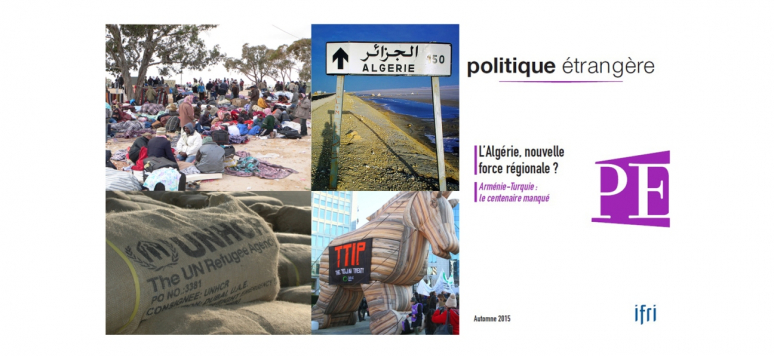Sommaires de Politique étrangère - Algeria, a New Regional Force? / Armenia-Turkey: the Wasted Centennial Politique étrangère, Vol. 80, No. 3, Autumn 2015

Algeria has appeared strangely calm despite an explosive regional environment. Nevertheless, a number of storm clouds lurk on the horizon: the fall of oil prices in a highly resource-driven economy; a decrease in revenues that have stood to maintain social peace; paralysis of the political system; instability in the Maghreb (Tunisia, Libya…) and the Sahel (Mali…). Algiers is faced with many difficult choices. How should the succession of president Bouteflika be settled in a society that is increasingly depoliticized but that nevertheless contests the regime’s opacity? Is it possible to finally diversify an economy that is still structured on rent from the country’s resources? How can the country protect itself from external disorder? As the major military power in the region, Algeria has followed a path of non-engagement in external affairs for decades. This is no longer viable. At both the internal and external level, the regime will have to demonstrate flexibility in dealing with new, potentially dangerous situations.
This issue of Politique étrangère also deals with two major themes of 2015: the 100 year anniversary of the Armenian genocide, which was a wasted opportunity to link Ankara and Erevan, but has proven to be revealing Turkish contradictions, among other things; the shifting of international migrations, in particular those involving Europe and the Mediterranean region.
A range of other topics are also explored in this issue that strike at the heart of many of the most pressing international debates today: The negotiation of a possible Transtlantic Trade and Investment Partnership (TTIP), Chinese visions of the “New Silk Roads”, the state of Somalia, piracy in the Gulf of Guinea, and relations between Muslims states and Islam in France.
FOCUS Algeria, a new regional force?
Algeria’s Permanent State of Economic Crisis [1], by Mihoub Mezouaghi
A Time of Change for Algeria’s Foreign Policy [2], by Jean-François Daguzan
Questioning Algeria’s Non-Interventionism [3], by Geoff D. Porter
The Evolution and Limits of the Algiers-Moscow Relationship [4], by Mansouria Mokhefi
COUNTERPOINT Armenia-Turkey: the wasted centennial
Turkey and the Armenian Genocide: from Denial to Recognition? [5] by Ali Kazancigil
Revisiting Relations 100 Years After the Armenian Genocide [6], by Michel Marian
CURRENT AFFAIRS
Migratory Flows in Mediterranean [7], by Catherine Wihtol de Wenden
Accommodating Refugees: the Other European Crisis [8], by Matthieu Tardis
BAROMETERS
TISA, TTIP: How Trading is done on Europe’s Behalf [9], by Emmanuel Vivet and Aurélien Colson
The “One Belt, One Road”. Strategic Implications of a Chinese Infrastructure Network in Eurasia [10], by Nadège Rolland
Somalia, the Modern Sisyphus? [11] By Jean-Bernard Véron
Regionalizing Maritime Security in the Gulf of Guinea: a Short-term Solution [12], by Thierry Vircoulon and Violette Tournier
FREE SPEECHES
Muslim States' Influence on Islam in France [13], by Bernard Godard
BOOK REVIEWS
Is the American Century Over? de Joseph S. Nye Jr. ; National Insecurity de David Rothkopf ; Au sein de la Maison-Blanche de Charles-Philippe David ; Watchdogs on the Hill de Linda L. Fowler, par Tristan Aureau
You can read in French the Editorial of Politique étrangère, vol. 80, n° 3, automne 2015 [14]
You can read in French the Book reviews of Politique étrangère, vol. 80, n° 3, automne 2015 [15]
